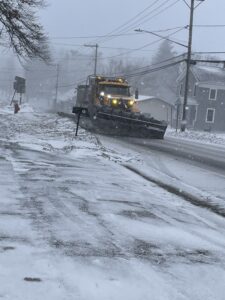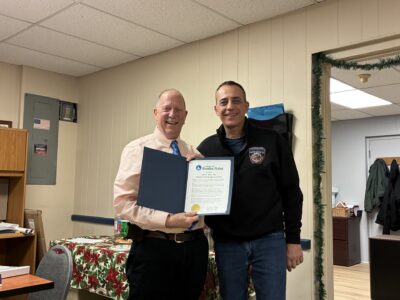BPU Wastewater Budget Eyes 2027 Rate Hike
As the Jamestown Board of Public Utilities continues to look forward into 2026 budget wise, they are also looking towards next year with the official appointment of a new General Manager.
During their October meeting, current deputy general manager, Kris Sellstrom, was officially appointed to take over the role of General Manager. He will take the place of David Leathers, who is retiring, and will take up the role in January.
“I look forward to serving you all and the community moving forward,” Sellstrom said. “I also want to take a moment to recognize David Leathers for all of the time he has put in here. He’s really set a strong foundation along with you all … thank you to Dave too for his guidance and mentorship.”
Members of the board congratulated Sellstrom on the appointment and thanked the BPU’s personnel committee for their work and a press release was sent out to announce the appointment.
Moving on to reviewing the draft budgets, the BPU’s next division’s budgets, Kevin Karr, finance and customer accounts manager, reviewed with the board were the wastewater and water division budgets. The budgets for the solid waste and district heating were also approved at the October meeting.
The preliminary wastewater budget sees sales revenue being stable, though Karr said it was slightly under budget this year, and for next year it is expected to be around the same amount. Like other divisions, Karr said the biggest issue is trying to control costs, though there is no projected rate increase.
“We do project a rate increase in 2027, but that will all depend on what happens in 2026,” Karr said.
Revenue for wastewater remains relatively stable every month, and Karr also reviewed ONM expenses, which include large repair bills for vehicles, and he said some of those are included in the capital budget to look at being replaced.
“Those are some things that we can control with our ONM budget,” Karr said. “Some of the other items, we don’t have much control over some of our other expenses but we try to keep track of our expenses and try to keep as much cost control as we can. That’s the big issue with purchasing, and all of our divisions do a good job in keeping track of their expenses.”
Karr highlighted looking at a decrease in other line items such as the wastewater treatment plant because of them controlling expenses. Karr then reviewed the capital budget for the wastewater division, before moving onto the water budget.
Water is at a critical cash position, he said, looking at multiple big items including a possible grant for the Cassadaga Pump House, which is in serious need of repair. There is a little revenue bump for 2026 due to the rate increase that was seen in 2025. Revenue has also been relatively stable for the past year. The division is also looking at well cleaning, repair for some of the other pump houses, and other normal everyday expenses and repairs.
Karr then reviewed other capital projects and expenses, including the pump house and a new billing system that will spread throughout all divisions. There is money budgeted for winter repairs and vehicle purchases.
Karr also briefly reviewed key budget items for the electric division, saying the projected increase from NYPA starting in April is something that will affect that budget. Other items reviewed included the power plant, infrastructure upgrades, and the grant for the microgrid project, which is working on being appealed after funding was lost.
The last thing affecting the electric 2026 budget is the state energy plans.
“The New York state energy plans, that always affects us,” Karr said. “Again, we don’t know sometimes what direction they’re going and we’re always looking at the possibility of electrification of vehicles but I think with the new federal administration that’s kind of been put on hold.”
A question was raised about the governor temporarily suspending the capital investment program and how that affects the BPU and these budgets, to which Karr said the BPU is always looking for grants and anything they can get to help offset costs. Losing a grant or the opportunity for state or federal funding to come through brings up the question of whether the BPU can then afford that project.
“If we can get the project done before something runs out we are definitely going to look and see if that’s possible,” Karr said.
It was also noted that the governor may not have the power to stop it and that program may continue to move forward, and a lot of renewable and zero-emission credits are already contracted for and will be coming either way.





